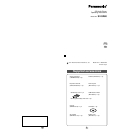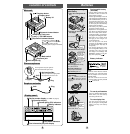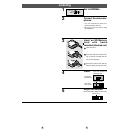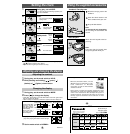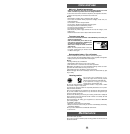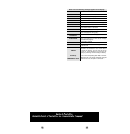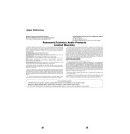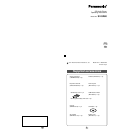
Clean with a soft, dry cloth.
Do not use any type of abrasive pad, scouring powder or solvent such as
alcohol or benzine.
11
Care and use
Maintenance
Main unit / Supplied accessories
• Keep the SD Memory Card and the rechargeable battery out of the
reach of children to prevent them from being swallowed.
• Leave some slack in the cord of the earphones, the earphone extender,
and the neck lanyard if you wind them around the unit.
Do not;
• disassemble, remodel, drop, or allow the unit to get wet.
• use or store in locations directly exposed to sunlight, a heat vent, or a
heating appliance.
• use or store in humid or dusty locations.
• use or store in locations exposed to corrosive gases.
• insert objects other than SD Memory Cards.
• use force to open the battery lid or card cover.
• use cracked or warped cards.
• short-circuit the power supply terminals of the unit, the charger, or the
battery case.
• detach the label on the card or attach other labels or stickers.
To protect your data
• Do not touch the metal terminals of the SD Memory Card with your
hands or metal objects.
• Use an oil-based felt pen to write on the
card. Do not use pencil or ballpoint pen
as these can damage the card.
• Take care to keep the metal terminals
free from ink.
• Switch the write-protect switch of the card
to “LOCK”. Unlock when you want to record
or edit the card again.
Rechargeable battery / Dry cell battery
• Remove the battery if the unit is not to be used for a long time.
• Carry and store the rechargeable battery in the supplied rechargeable-
battery case to prevent contact with metal objects.
Do not;
• recharge ordinary dry cell batteries.
• disassemble, short-circuit, or put in a fire or water.
• peel off the cover or use if the cover has been peeled off.
Mishandling of batteries can cause electrolyte leakage which can dam-
age items the fluid contacts and may cause a fire.
If electrolyte leaks from the battery, consult your dealer.
Wash thoroughly with water if electrolyte comes in contact with any part
of your body.
Listening caution
Do not play your headphones or ear-
phones at a high volume. Hearing experts
advise against continuous extended play.
If you experience a ringing in your ears,
reduce volume or discontinue use.
Do not use while operating a motorized vehicle. It may create a traffic
hazard and is illegal in many areas.
You should use extreme caution or temporarily discontinue use in poten-
tially hazardous situations.
Even if your headphones or earphones are the open-air type designed to
let you hear outside sounds don't turn up the volume so high that you
can’t hear what’s around you.
Sound can be deceiving. Over time your hearing “comfort level” adapts to
higher volumes of sound. So what sounds “normal” can actually be loud
and harmful to your hearing.
Guard against this by setting your equipment at a safe level BEFORE
your hearing adapts.
To establish a safe level:
• Start your volume control at a low setting.
• Slowly increase the sound until you can hear it comfortably and clearly,
and without distortion.
Once you have established a comfortable sound level:
• Leave it there.
Write-protect
switch
Lock
EST. 1924



